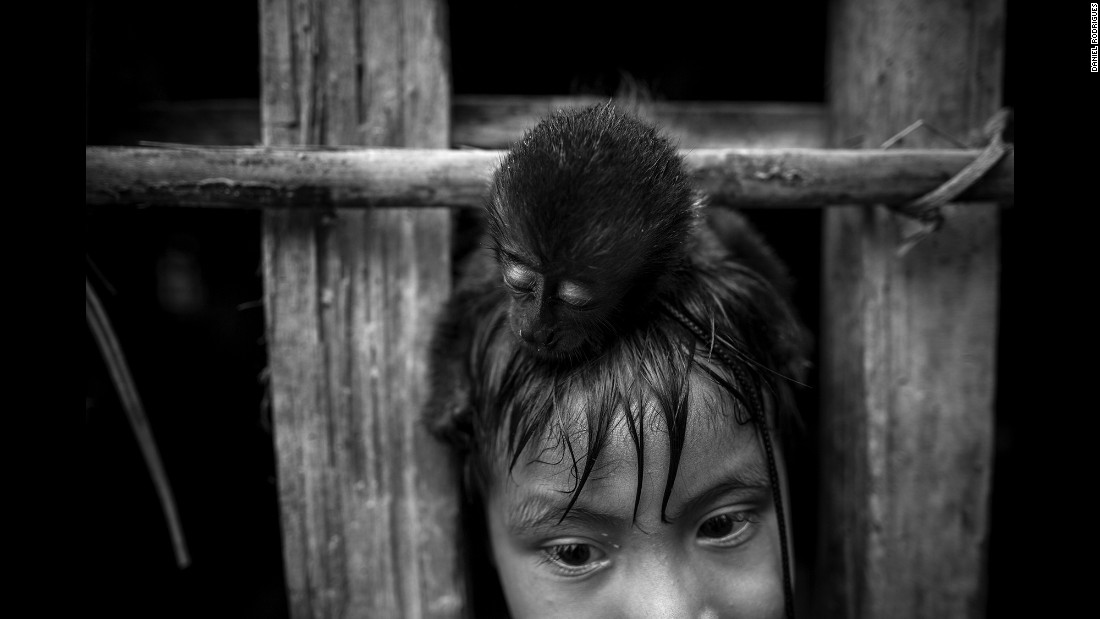
Some animals, such as the capybara and the harpy eagle, are taboo and no Awá will eat them. The forest provides its bounty, but not everything is taken. But each hunter maintains a highly crafted bow and set of arrows for when the ammunition runs out. Some settled Awá have confiscated shotguns from poachers and have become skilled marksmen. Arrows fly high and silent into the forest canopy, allowing several shots before game is alerted to the hunters’ presence. Those Awá still living uncontacted in the forest hunt with 2 metre (6 foot) long bows. Women encourage their husbands to return with plentiful game meat, and the men oblige. ‘If my children are hungry, I just go into the forest and I can find them food,’ says Peccary Awá. ‘If you destroy the forest, you destroy us too.’ Sustaining themselves entirely from their forests in nomadic groups of a few dozen people, and with little or no contact with the outside world. However, for the most part, they were able to maintain their traditional way of life. From the mid-1980s onward, some Awá moved to government-established settlements. Beginning around 1800, the Awá people adopted an increasingly nomadic lifestyle in order to avoid European invaders. During the 19th century, the Awá came under increasing attack by European settlers in the region, who cleared most of the forests from their land. Originally living in settlements, they adopted a nomadic lifestyle around 1800 to escape incursions by Europeans. The Awá people speak Guajá, a Tupi–Guaraní language. They are considered highly endangered because of conflicts with logging interests in their territory.

There are approximately 350 members, and 100 of them have no contact with the outside world. It all starts with awareness, so you really don't have to open your door to all the crawling creatures in the garden.The Awá-Guajá are an indigenous people of Brazil living in the Amazon rain forest. In this way they give the soul back to the sea, to ensure that there are enough new animals, and the soul can begin the rest of its life. The Inuit believe that the bladder contains the soul of the animal, and during the ‘Bladder Festival’ the bladders are blown up and stuffed into the ice. He takes the animal's bladder home with him, and it is kept until it is time for the ‘Bladder party'. After a hunter has caught a sea creature, he first thanks the animal for his sacrifice. They hunt aquatic animals during the season, drilling a hole in the ice. The Inuit have a special ritual of honoring the slaughtered animals. But both the Chuckhi and the Dukha, will never slaughter a healthy animal for their own use. His or her death is not for nothing: everything is used, from bone to skin. The reindeer of the Dikha are sacred and are only slaughtered - quickly and painlessly - when they are old or sick. The dogs participate in daily life by pulling the sleds over the ice, but during heavy snowstorms they are just lying between the family before the fire in the yurt. The Chukchi from Siberia has just as special a bond with their Huskies. The animals are considered to be hanima, part of the family. Monkeys and raccoons are the pet animals of the jungle and are taken in abundance. Small animals such as the hummingbird are not shot at all, because they are too small to provide sufficient nutrition. This gives the species concerned time to recover during the period when it is not being hunted. However, they have some useful guidelines, whereby certain species are only hunted during certain seasons. They are hunters and collectors and rely entirely on nature. A good example is the Awá tribe from the dense forests of the Amazon. It is striking how different tribes treat the animals, both pets and wildlife, then the 'modern' world. Both are insects, both have a contribution (mosquitoes are food for fish and other reptiles, ladybirds help protecting our plants from aphids). We kill a mosquito with all ease, while a cute ladybird is unharmed led outside. Not only those with a high stroke factor, but every living being on earth. Don't misunderstand me I don't mind eating meat, or using animal materials, but the way it sometimes happens is absolutely a no go.Īs the old nomads teach us, we must treat animals with respect and decency.

Unfortunately, we do not always have a peaceful society take the slaughterhouse affair last year, or the terrible conditions with the Angora rabbits. It’s obvious, because they were there before human.
Awa tribe pets full#
More and more cats, like dogs by the way, are seen as full family members.Īnimals have had a place in our lives since the birth of mankind. Whereas the cute fluffy bulbs in ancient Egypt played an important role in the Egyptian religious life, they now occupy a prominent place in many households.

Next to animal day we have - of course - a cat day. We have a day for everything Brother and Sister Day, Sunglass Day, SelfieDay, so on.


 0 kommentar(er)
0 kommentar(er)
